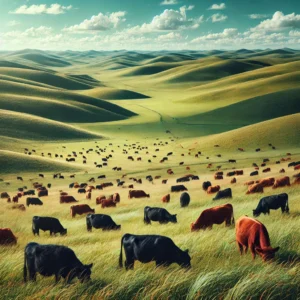 Everything in the universe belongs to God. The planets, the stars, the asteroids floating through space, and even the things humans have not yet discovered all belong to him. The psalmist declared in Psalm 24:1 that “The earth is the Lord’s and all that is in it.” He owns every plot of land, every building, every piece of sand, every car on the highway; it all belongs to him. So, we should not be surprised when we come across a verse like Psalm 50:10 that declares God’s ownership of cattle. Some have used this verse to encourage others that God will faithfully provide for their needs, and while he will provide for us, that is not what this verse is talking about.
Everything in the universe belongs to God. The planets, the stars, the asteroids floating through space, and even the things humans have not yet discovered all belong to him. The psalmist declared in Psalm 24:1 that “The earth is the Lord’s and all that is in it.” He owns every plot of land, every building, every piece of sand, every car on the highway; it all belongs to him. So, we should not be surprised when we come across a verse like Psalm 50:10 that declares God’s ownership of cattle. Some have used this verse to encourage others that God will faithfully provide for their needs, and while he will provide for us, that is not what this verse is talking about.
“For every wild animal of the forest is mine, the cattle on a thousand hills. I know all the birds of the air, and all that moves in the field is mine.” – Ps. 50:10-11
God will certainly provide for us, and we have many Scriptures that give us that assurance. Hebrews 13:5 reveals that God will never leave or forsake us, 2 Corinthians 9:8 shows that God can provide us with everything we need and more, and Matthew 6:25-34 Jesus taught that if God takes care of the birds and the grass, he will certainly take care of us. But this verse in the Psalms is not speaking to the issue of blessing. It has been misused for a long time by well-meaning preachers who have made statements like, “God owns the cattle on a thousand hills, so don’t work about your financial needs. He has enough to take care of all of us.” This is a misapplication of this particular verse.
Psalm 50:10 is actually about animal sacrifice. If we rewind to v.7, we see that God is speaking to the Israelites about the sacrificial offering of animals. He makes it clear that he does not need their sacrifices. The sacrificial process was put in place because the Israelites needed him. God prescribed different types of sacrifices within the law, and if we keep reading beyond v. 11, it seems they needed a reminder about the purpose of the thanksgiving sacrifice prescribed in Leviticus 11:7-15.
So, God is not bragging about his wealth here. He is not making a statement that he can divide up the birds and the cattle from his great wealth to anyone he wants. Rather, he is stating that the animals they are sacrificing already belong to him. Not only does he own the cattle on a thousand hills, but he also owns every head of cattle on the planet. He does not need anyone to give him anything. The requirements he reminds the Israelites about here were for the people to come and offer a sacrifice of thanksgiving to God for all that he had done for their people.
If we back up a little further to v.1, we will also discover that the writer may have been drawing a comparison between the one true God and the false god Shamash who was worshipped in Babylon. Hammurabi, one of the kings of the Babylonian empire, established a code of laws and a pillar that contained these laws had a depiction carved into the top of it with Shamash seated on a throne with Hammurabi standing before him. Translations of this pillar describes Shamash as a divine judge who is seated over all people. We see similar imagery in the description of God in the first few verses of this chapter. It establishes God’s supreme authority and then provides correction about the thanksgiving offerings.
It is important to never establish a theological position on a single verse that is plucked out of context. We also need to be careful in applying something we know to be true to the wrong verse. It is true that God will provide for us, but Psalm 50:10 is not the verse one should use to back up that assertion. This is evident in many other theological positions as well, so we should all be careful to search out the fullness of the Scriptures before declaring what we believe they are saying.